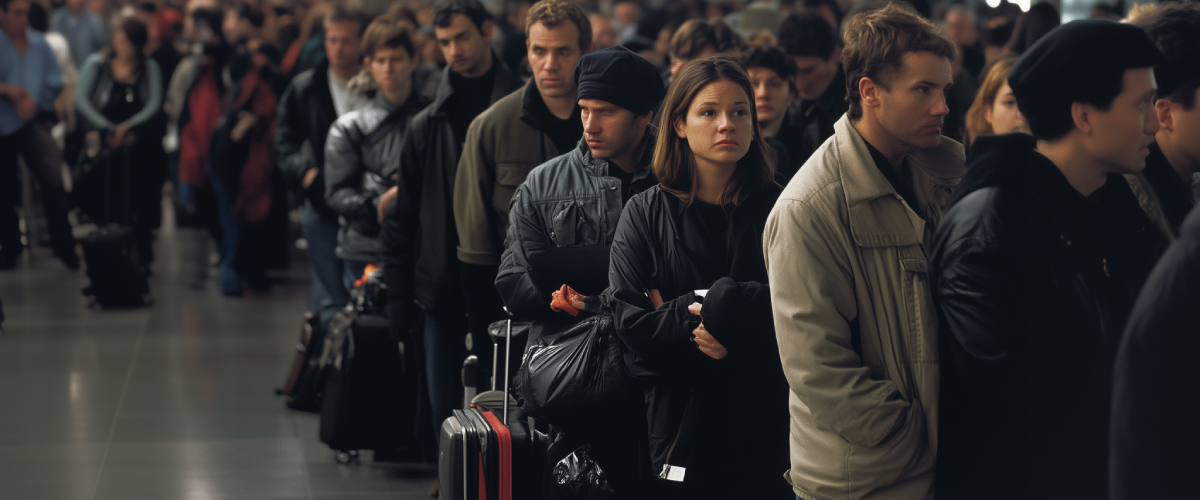We’ve all experienced the realization that the airport security procedures we’re humiliated by are useless.
“Security theater” is a term I’ve heard to describe it, and I think that’s a fitting description.
TSA‘s 95% Failure Rate: Is Airport Security Just for Show?
My own breaking point occurred about 15 years ago when I witnessed an elderly woman in a wheelchair subjected to a humiliating TSA pat-down. The screener—a woman who could have played defensive tackle for the Arizona Cardinals—removed a hairpin from the woman’s hair and screamed at her for carrying a dangerous weapon.
Free Wealth Protection Insights
Enter your email below to receive our weekly briefings on better ways to preserve your wealth, legally reduce your tax bill, and better protect what you’ve worked hard to build.
The Nestmann Group does not sell, rent or otherwise share your private details with third parties. Learn more about our privacy policy here.
PLEASE NOTE: This e-series will be delivered to you via email. You should receive your first message minutes after joining us. By signing up for this course, you’ll also start to receive our popular weekly publication, Nestmann’s Notes. If you don’t want to receive that, simply email  or click the unsubscribe link found in every message.
Meanwhile, two hours later, I was sitting in business class enjoying a steak—served with metal utensils. No one in my section needed a wheelchair.
TSA Security Failures: The Numbers Don’t Lie
Yet nearly two decades after 9/11, TSA security failures remain shockingly common.
In 2015, the TSA sent undercover agents to dozens of America’s largest airports to test security protocols. The results? Agents successfully smuggled fake explosives or weapons through TSA checkpoints 95% of the time.
The TSA failed in 67 out of 70 tests.
Is There a Better Security Model?
I’m not a security expert, but I’ve long believed that larger airports need more robust security than smaller ones.
For that reason, I was heartened to learn that the TSA is considering removing or cutting back on security checkpoints in smaller US airports that service planes seating 60 or fewer people. This would allow agents to be redeployed to larger airports servicing bigger planes.
It’s an interesting proposal, but critics argue that terrorists will target smaller, less-secured airports.
That’s a valid concern. However, security wouldn’t be entirely eliminated at smaller airports. And even if terrorists manage to board a commuter plane that seats 60 people, the worst they could do would be to destroy a small aircraft—a tragedy, but not a mass-casualty event like 9/11.
The Most Effective Post-9/11 Security Measure
A repeat of 9/11 is unlikely, thanks to one major security improvement: Reinforced cockpit doors.
Unlike pre-9/11 flights, no terrorist can easily force their way into the cockpit anymore. This single change eliminates the possibility of another hijacked plane being used as a weapon.
What Can the US Learn from Israel’s Security Model?
One way to truly improve airport security is to look at countries that face far greater security threats—like Israel.
Since 1968, no flight to or from Israel has been successfully hijacked.
How? Israel focuses on identifying terrorists, not random objects.
Key Differences Between Israel and TSA Security
TSA Security Theater
-
Focuses on detecting prohibited objects—even harmless ones like a hairpin.
-
Requires passengers to remove shoes before boarding.
-
Uses expensive full-body scanners instead of simpler metal detectors.
-
Implements passenger interviews on some flights but in a cursory, inconsistent manner.
Israeli Security Approach
-
Prioritizes identifying potential threats rather than confiscating objects.
-
Screens every passenger through direct questioning by trained agents who analyze body language and behavior.
-
Uses traditional metal detectors instead of costly full-body X-ray scanners.
-
Does not require passengers to remove their shoes.
The TSA’s Attempt at Behavioral Screening (and Why It’s Flawed)
Since 2017, the TSA has required 180 airlines flying to the US to interview passengers before boarding.
Sounds great, right? The problem? TSA’s implementation is weak.
On a recent British Airways flight from London to Phoenix, I was asked only two or three cursory questions. After that, I received my boarding pass—no real screening at all.
In contrast, Israel’s security approach takes behavioral screening seriously. Every passenger is closely analyzed, and their responses determine the level of scrutiny they face.
Does Racial Profiling Work?
There’s no denying that Israel profiles passengers based on factors like race, religion, citizenship, and age.
In the US, this would raise serious legal concerns.
And rightly so. Singling out passengers based on religion or skin color is a slippery slope.
That said, Israel’s security model has a perfect track record. So, the real question is:
How much security do we really want?
Time to Rethink TSA Security
Personally, I’m willing to risk an occasional security breach if it means less government intrusion into our lives.
A wheelchair-bound grandmother with a metal hairpin is no threat. In a rational security model, she wouldn’t be harassed.



